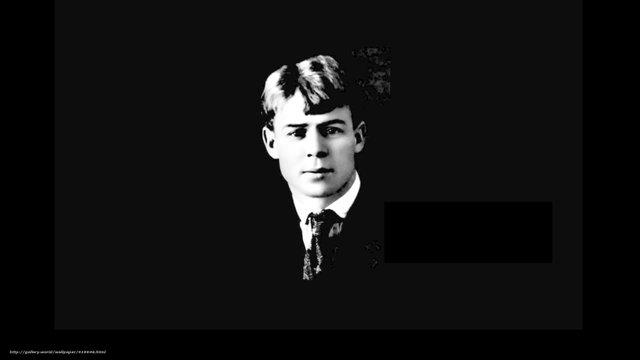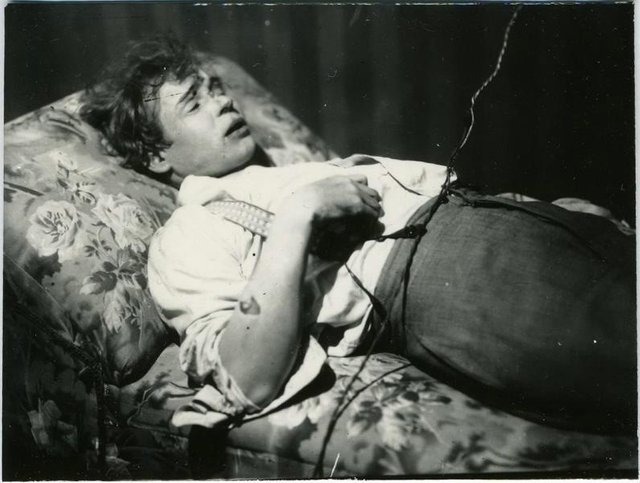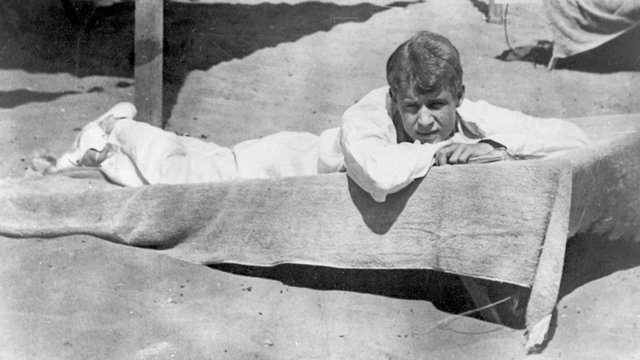/ Sergei Yesenin / Goodbye my friend, goodbye / essay

"Suicide of the poet Sergei Yesenin" - this sensational news was published by the Leningrad New Evening Newspaper on Tuesday, December 29, 1925. And this word - suicide, was proclaimed in Russia by huge press circulation, before the police and medical investigation confirmed it. From the very beginning, it provoked the subjugation of the poet's family and friends. It has been repeated for decades as the only, indisputable truth about Yesenin's death.
Allegedly, Yesenin ended up at the Angleterre Hotel after being forcibly removed from the writers’ bar, where he knocked over furniture, smashed glasses on the floor, and abused his fellow drinkers with claims that they were“arrivistes” and “mediocre.” He spent two days drinking vodka in his hotel room, before slashing his wrists on Dec. 27 and writing his last poem with his own blood.
The song Goodbye my friend, goodbye (До свиданья, друг мой, до свиданья) was taken as a crown proof that he had left his life with his will and expressed his farewell message with verses ''To die, in this life, is not new, And living’s no newer, of course.'' :
До свиданья, друг мой, до свиданья.
Милый мой, ты у меня в груди.
Предназначенное расставанье
Обещает встречу впереди.
До свиданья, друг мой, без руки, без слова,
Не грусти и не печаль бровей,-
В этой жизни умирать не ново,
Но и жить, конечно, не новей.
Farewell, my good friend, farewell.
In my heart, forever, you’ll stay.
May the fated parting foretell
That again we’ll meet up someday.
Let no words, no handshakes ensue,
No saddened brows in remorse, -
To die, in this life, is not new,
And living’s no newer, of course.

What seems like an open and shut case of suicide may not be so simple. In the months leading up to his death the Soviet authorities had become increasingly concerned about the poet’s drunken debauchery. Criminal charges were brought against him and his friends because of their numerous brawls, and the Bolsheviks feared that Yesenin could start to denounce the new government. Apparently there was even discussion of putting the poet under continual surveillance. This has led to unproven speculation that Yesenin was assassinated by the secret police – a theory that is still hotly contested.
Yesenin was so famous that his death triggered a wave of copycat suicides. The communist authorities, who viewed Yesenin’s poetry with suspicion for its individualism and “hooliganism,” reacted strongly, and his books were banned for many years after his death. Students who read his poems could be expelled from university, and distributing manuscript copies of his poems was punished with jail time. (1)
The Dark Man (Черный человек)
Hear me, hear me, friend.
I’m very, no, seriously ill.
What’s the reason? This pain I do not understand.
As if wind whistles, listen
Over desolate, vacant, still field.
Like a grove, leaves blazing I feel.
And the drink sheds my leaves as I bend.
Head of mine is a-flapping my ears
Like a migrating bird -- wings.
Near my neck, no legs want
To waver and pause; to and fro.
Dark man, here he is,
Dark man, here he is,
On my bed, near me sits, haunts me.
Dark man…
He won’t let me rest all night long.
The dark man
Runs his finger over a horrid tome,
And a-mumbling over me,
As if at a deathbed, a monk drones,
He reads a strange life to me:
Of a swindler, a no good looser without a home.
And my soul is veiled in sadness and fear of him.
Dark man, here he is.
Oh, so dark.
“Listen up, listen,”
He screeches at me,
“In this book, plans a plenty;
Good thoughts and some wonders.
It says, a man used to live
In a haphazard country,
Which ruffians and charlatans
Tear asunder.
In December, that place
Shows off snow, pure as hell,
Which the blizzards spin in
Joyous layers.
Hero of ours adventures befell
He was
A schemer, yet kind
And debonair.
He was well mannered.
A poet, it appears.
Not so brawny,
But with a solid, strong grasp.
And a chic foreign woman
Of some forty plus years
He renamed “his naughty girl”
Called “his love” in the past.
Happiness – he’d say is
A trick of the mind and hands.
All naïve, clumsy souls
As despairing, are always known.
C’est la vie
Life brings pains
And cunning, deceit
As dresses are simply worn.
In downpour and lightning,
When life is a chill,
Or if you loose someone dear,
Just keep on smiling
Switch to “happy” at will,
It’s “Haute art”, young man, do you hear…”
“No, you jest, dark man!,
Don’t dare show me the “light”!
I do not believe
That you’re in the lifeguard trade.
I do not care about
A scandalous young poet’s life
Please, find yourself some pals
And spin yarns elaborate.”
Dark man stirs and stares at me
Looks beyond and yonder.
Rolls his eyes and they turns sickly
Bluish. Vomit… Flee…
“Do not tell me that I am
A thief, crook, and scoundrel,
So shamelessly and rudely
Having swindled somebody.”
(the whole poem in english and russian : http://stihi.ru/2003/04/01-311 )
After his death, when The Dark Man poem was published, many critics appeared and the attacks on Yesenjin were merciless. It is considered particularly dangerous for younger generation. Dogmatics found "evidence" in Yesenin's poetry: decadence, individualism (and then celebrated collectivism), drunkenness, idleness, disbelief in everyday life and its public deprivation, the clown of the soul...
''The poet is sick, he is in the grave!" wrote A. Voronsky about Yesenin's last songs, designating them as a psychiatrist and clinic material. .
The blasphemy in the verses of the The Dark Man was also seen by P. Medvedev: the poem is so subjective and publicly pathologic that it was difficult to obtain "from this material" any significant artwork. "It's an agony not only of a poet but of a man," claimed Medvedev.

Maxim Gorky stood up in the protection of Yesenin. Gorky writes to Belgian writer Franz Ellens in 1926: "If you would know, my dear, what wonderful, sincere and touching poems he wrote before his death, how magnificent his poem The Dark Man which just came from the press. We lost a great Russian poet."
And Vladimir Mayakovsky stopped in the Yesenin defense. He writes:
"There were songs, articles and memories, even drama. In my opinion, 99% of what was written about Yesenin is simply nonsense, or harmful nonsense. "
A man facing the evil at a dramatic moment in front of and inside the mirror is the pinnacle of Yesenin's poetic art, widely interpreted and well-known everywhere in the world. The poem "The Dark Man" is terrible as the expression of Yesenin's personal drama and even more terrible as the symbolic announcement of a man's titanic struggle against himself as his own enemy - written by Professor Miodrag Sibinovic, who lucidly observes: "For Yesenin's condition, however, the poem ends with the lyrical hero breaking the mirror from which a dark man appears (the dark man himself, therefore, has not yet been destroyed)."
This was partially a translation from Serbian to English from PULSE article ''Do viđenja, druže – Sergej Jesenjin'' by. Lj.Vukmanovic
(1) The final days of Russian writers: Sergey Esenin and Vladimir Mayakovsky
ARTS & LIVING JUN 25, 2014 YOLANDA DELGADO SPECIAL TO RBTH